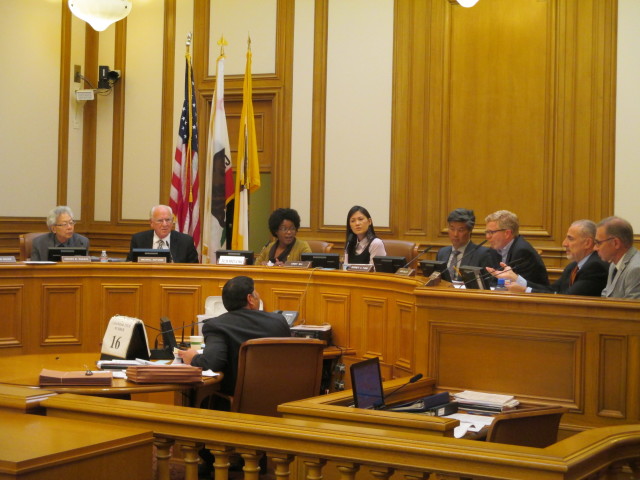SF Planning Commission ducks the biggest issue in passing along a new transit-impact fee

By Tim Redmond
SEPTEMBER 11, 2015 –The debate at the San Francisco Planning Commission this week left me wondering if anyone at City Hall is willing to stop worshiping at the Altar of Growth. No matter what the cost.
The issue, as lawyer Sue Hestor noted, was “very big legislation” – a proposal to overhaul the fees that the city charges developers to offset the transit impacts of their buildings.
The idea, Hestor testified, went back to the era right after Prop. 13 passed, when it was clear that, lacking property-tax revenue, Muni was going to completely fall apart.
So the city implemented a Transit-Impact Development Fee that charged the developers of office buildings for the costs of adding Muni buses and workers to serve the populations of their buildings.
At the time, studies showed it would cost about $10 a square foot to mitigate the impacts. The city went with half of that – the fee was set at $5. So the rest of us – Muni riders, drivers, taxpayers – subsidized the rest.
But at least we only paid half. The commission voted Thursday to recommend that future developers pay no more than a third of the cost they dump on the city.
There were the usual surreal moments: Commissioner Michael Antonini announced that nonprofit affordable housing developers should also pay the fee (despite the fact that most of their money comes from the city anyway, so it would be transferring cash from one city department to another) and that parking areas should be exempt because “there will be fewer people using public transportation if they have cars.”
But moving back to reality, the gist of what everyone – from the planning staff to the speakers in public comment to the commission members – said was this:
The fee that the city is about to charge is far, far below the actual impact that new development has on the city’s transit system. At best – at the very best – the city might charge developers one-third of what they will cost the local transportation system.
There are other issues. The mayor’s proposal would grandfather in everyone who is currently in the planning pipeline, even the ones who applied for permits well after it became clear that the city was changing the impact fees.
The proposal doesn’t count garage space in the tally of how many square feet a building includes – meaning it’s cheaper to cut housing space and make more room for cars.
But the biggest question is the price, and while several commissioners raised some important and valid questions, only Dennis Richards even mentioned the defining issue:
“In a world-class city, growth has to pay for growth.”
Richards mentioned Sup. Scott Wiener’s ambitious subway plan. He talked about the $3.3 billion in unfunded Muni maintenance liabilities (and that’s assuming that the impact fee is approved, and the city raises the Vehicle License Fee, and a few other things).
He said that in some parts of town, the return on development is so high that nobody should worry about fees discouraging new projects. “I talk to developers and they tell me that they don’t worry about inflation in construction costs, because inflation in revenue [from new buildings] is rising faster,” he said.
Commissioner Hope Johnson said that choosing the right level for the fee was like “making sausage.” (Commissioner Kathrin Moore noted, though, that the commission was indeed making sausage, and ought to do it right.) Johnson said she didn’t know the right level, but maybe the supervisors could figure it out.
The study that showed developers would be unlikely to build if they are charged higher rates assumed a high level of return – 20.5 percent – which is way above what most investors get these days. “Is that sacrosanct?” Richards asked.
Maybe not. Moore suggested that right now, “we are in a robust economy” and that the fee should be much higher – because if the economy slows, “it will go down anyway.”
But in the end, the discussion came back to: Gee, if we charge too much for transit impacts, the developers won’t build anything.
Which means: If you and me, the taxpayers and Muni riders, are unwilling to subsidize billionaire investors and developers, then development won’t happen.
And … what’s wrong with that?
Seriously: If growth should pay for growth, there may come a time where we as a city have to say that the costs are higher than the benefits, and we’ve grown too fast, and it’s time to slow down.
The commission voted unanimously to send the plan to the Board of Supes with the suggestion that the rate should be increased to as much as 33 percent of the actual cost (with the rest of us subsidizing 66 percent of the cost of Muni service for developers) and a few changes in the grandfathering.
But still: If growth costs the current residents of this city more than they are getting in return, why is that a good deal? What if we said to developers, hey – pay the full cost of the impact you create, or don’t build here, and they decided to go build somewhere else? Would that be so awful?
Just asking.







